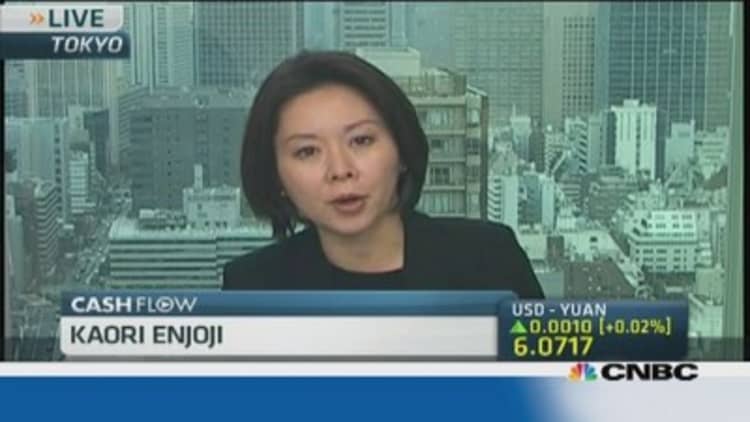
The Nikkei climbed 2 percent on Wednesday, with talk that Japan's prime minister could add details to his economic reform plans this week helping the blue-chip stock index outpace its Asian peers.
Speculation that Prime Minister Shinzo Abe could on Thursday flesh out details of the so-called "third arrow" of a three-pronged strategy to get Japan's economy back on its feet, pushed the yen down and gave the Nikkei some momentum, traders said.
(Read more: And the next driver for Japan stocks is…)
"I think that rumor is certainly out there and we are hoping for more details on the reform plans," said Glenn Wood, head of sales, global, at Mitsubishi UFJ Morgan Stanley Securities in Tokyo. "The market still has a long way to go in terms of factoring in any upside on the third arrow of Abe's economic reform plans."
The Nikkei was up 2 percent in early afternoon trade in Asia at about 15,587 points, nearing a 6-1/2 month peak hit earlier this month. It outperformed the MSCI index of Asia-Pacific shares excluding Japan which was up just 0.2 percent with most markets sidelined ahead of Wednesday's Federal Reserve decision.
(Read more: Bernanke should lay groundwork for QE pullback)
Japan's stock market has soared almost 50 percent this year, making the Nikkei the best performing major equity market globally.
Those gains have come against aggressive monetary and fiscal stimulus to end almost two decades of deflation and revive Japan's economy – the third biggest in the world.
Still, there has been some skepticism about Abe's long-term plans for economic reform and a lack of detail on this front has tempered the Nikkei's rally in recent months.
(Read more: Abenomics scorecard: 'A' for early initiative, 'C' for follow-through)
"We think the third arrow is complicated. It's really a 1,000 darts or incremental changes in the structure of the Japanese economy," said Ed Rogers, CEO and CIO at Rogers Investment Advisors in Tokyo, adding that he maintained his upbeat view on the Nikkei.
"We are in the first year of a multi-year positive cycle for Japan and our key message to investors is that most of you are under invested or not invested in Japan," Rogers told CNBC Asia's "Cash Flow." "That has paid off in the last 20 years, but you need to change your view on Japan now."
The Nikkei this year
Japan's government has made some positive steps such as pushing ahead with a rise in the consumption tax, which is seen as key to helping alleviate the country's debt burden. But more needs to be done to in terms of structural reforms, analysts say.
Hans Goetti, chief investment officer at Finaport, told CNBC he was sticking with his call for the Nikkei to rise a further 50 percent over the next 18-24 months.
"The Bank of Japan is ready to do whatever it takes to get to the [2 percent] inflation target," he said.
"They will get there and once you have that inflation mentality entrenched, you have 1,000 trillion yen, roughly $10 trillion in cash and money market funds put under the mattresses during the deflationary environment and that money will go somewhere," Goetti added. "Even if a small part goes into equities, the market will go higher."



